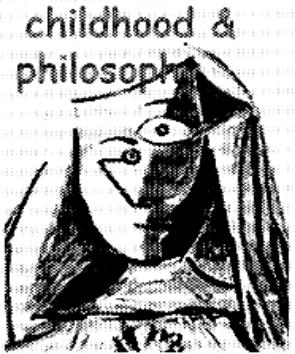exploring the application of empirical research in philosophy for children
analysis of two case studies in caring thinking
DOI:
https://doi.org/10.12957/childphilo.2025.88956Palavras-chave:
pensamento cuidadoso, pesquisa empírica, lipman, filosofia para criançasResumo
Este estudo explora se a eficácia dos programas de Filosofia para Crianças (FpC) pode ser verificada por meio de pesquisa empírica. Primeiramente, analiso a pesquisa empírica pioneira conduzida por Matthew Lipman na década de 1970 para avaliar o aprimoramento das habilidades de pensamento crítico de crianças do ensino fundamental que participaram de aulas usando seus romances de filosofia. Em seguida, exploro a base teórica para a integração do pensamento crítico e criativo na abordagem multidimensional do pensamento de Lipman, na qual o pensamento cuidadoso é um componente fundamental. Ao fazer isso, analiso as implicações do surgimento do pensamento cuidadoso. Na sequência, examino as tendências da pesquisa empírica sobre o pensamento cuidadoso na Coreia do Sul e em outros países. Por fim, apresento dois exemplos de pesquisa (uma quantitativa e outra qualitativa) cujo tema central é o pensamento cuidadoso. Analiso detalhadamente os resultados do estudo qualitativo e discuto se há implicações comuns para a realização de pesquisas empíricas sobre o pensamento cuidadoso que podem ser encontradas tanto em estudos quantitativos quanto qualitativos, e se as limitações deixadas por um podem ser potencialmente compensadas pelo outro. Para concluir, defendo que a pesquisa empírica, conduzida de forma a complementar a pesquisa quantitativa e qualitativa, pode ser uma maneira de validar e fortalecer os objetivos filosóficos da Filosofia para Crianças (FpC).
Downloads
Referências
Ābedi, M., Norouzi, R., Heydari, M., & Mehrābi, H. (2018). Presenting a Conceptual Model of the Relationship Between Philosophy for Children (with an Emphasis on the Dimension of Caring Thinking) and Emotional Intelligence. Journal of Educational Innovations, 17(1), 131–150. https://www.noavaryedu.oerp.ir/article_79142.html?lang=en
Asgari, M., Whitehead, J., Schonert-Reichl, K. A., & Weber, B. (2023). The Impact of Philosophy for Children on Middle School Students’ Empathy, Perspective-Taking, and Autonomy Preliminary Outcomes. Analytic Teaching and Philosophical Praxis, 43(1), 26–44.
Bierman, M. L. (1976). A Pilot Study in the Teaching of Logic Research Conclusions. In Lipman, M. (1976). Philosophy for Children. Metaphilosophy, 7(1), 17–39.
Brenifier, O. (2008). Caring Thinking About Caring Thinking. Revision and Suggestions by Janette Poulton, https://buf.no/old/pdf/ob-ct.pdf
Brunt, J. (1996). Caring Thinking: The New Intelligence. Australasian Journal of Gifted Education, 5(1), 21–25. https://search.informit.org/doi/10.3316/aeipt.71697 (Abstract Only). Republished as Brunt, J. (2003). Caring Thinking: The New Intelligence. Gifted, (130), 13–16.
Dai, I. (2015). The Roles of Philosophy in Ecology Education: The Approach of Introduction to Eco-Philosophy. Eco-Philosophy, Issue 9: 25–34.
Dombaycı, M. A., Demir, M., Tarhan, S., & Bacanli, H. (2011). Quadruple Thinking: Caring Thinking. Procedia: Social and Behavioral Sciences, 12, 552–561.
Dombaycı, M. A. (2014). Teaching of Environmental Ethics: Caring Thinking. Journal of Environmental Protection and Ecology, 15(3), 1404–1421. https://avesis.gazi.edu.tr/yayin/ae86b5d3-8f52-481c-ad2b-19129711f93a/teaching-of-environmental-ethics-caring-thinking
Freytag, G. (1894/2008). Freytag’s Technique of the Drama: An Exposition of Dramatic Composition and Art (E. J. MacEwan, Trans.). BiblioBazaar.
Lipman, M., & Sharp, A. M. (1975). Teaching Children Philosophical Thinking: An Introduction to the Teacher’s Manual for Harry Stottlemeier’s Discovery. [ERIC Number: ED103297]. https://files.eric.ed.gov/fulltext/ED103297.pdf
Lipman, M., & Sharp, A. M. (1978). Can Moral Education Be Divorced from Philosophical Inquiry? In M. Lipman & A. M. Sharp (Eds.), Growing Up with Philosophy (pp. 338–368). Temple University Press.
Lipman, M. (1973). Philosophy for Children. [ERIC Number: ED103296]. https://eric.ed.gov/?id=ED103296
Lipman, M. (1987). Ethical Reasoning and the Craft of Moral Practice. Journal of Moral Education, 16(2), 139–147.
Lipman, M. (1995). Caring as Thinking. Inquiry: Critical Thinking Across the Disciplines, 15(1), 1–13.
Lipman, M. (1996b). Nous. Institute for the Advancement of Philosophy for Children.
Lipman, M. (2003). Thinking in Education (2nd ed.). Cambridge University Press.
Miwha, J., Jongwoo, J., & Hyein, J. (2023). A Study on the Possibility of an Ecological Education Program on Ecological Sensitivity and Caring Thinking: Focusing on Upper Elementary School Students. Korean Journal of Environmental Education, 36(3), 207–226.
Morehouse, R. E. (2018). Caring Thinking, Education of the Emotions and the Community of Inquiry. In M. Gregory & M. Laverty. (Eds), In Community of Inquiry with Ann Margaret Sharp: Childhood, Philosophy and Education (pp. 197–208). Routledge, Taylor & Francis Group.
Nussbaum, M. C. (2001). Upheavals of Thought: The Intelligence of Emotions. Cambridge University Press.
Sharp, A. M. (1991). The Community of Inquiry: Education for Democracy. Thinking: The Journal of Philosophy for Children, 9(2), 31–37.
Sharp, A. M. (2004). The Other Dimension of Caring Thinking. In M. Gregory & M. Laverty. (Eds), In Community of Inquiry with Ann Margaret Sharp: Childhood, Philosophy and Education (pp. 209–214). Routledge, Taylor & Francis Group. (Originally published in Critical & Creative Thinking: The Australasian Journal of Philosophy for Children, 12(1), 65–71, 2004.)
Shefaee, T., Hejazi, E. & Ghaedi, Y. (2024). The Effectiveness of Caring Thinking Training on the Well-Being of Sixth Grade Elementary Students. Thinking and Children, 14(2), 227–247. https://fabak.ihcs.ac.ir/article_9269.html
Sprod, T. (2001). Philosophical Discussion in Moral Education: The Community of Ethical Inquiry. Routledge.
Stoupathis, K. (2023). How Lipman’s “Caring Thinking” Theory for Human Thought May Encourage the Safeguarding of Industrial and Technological Heritage. Conservar Património, 44, 57–66. https://conservarpatrimonio.pt/article/view/28987
Tavakoli, M., Safian, M. J., Ghaedy, Y. & Ardalani, H. (2022). Some Points from the Quranic Story of Moses and Khezr Regarding Teaching Caring Thinking Based on the Doctrines of Philosophy for Children. Journal of Islamic Education, 17(39), 73–91. https://islamicedu.rihu.ac.ir/article_1927.html?lang=en
Tibaldeo, R. F. (2023). Matthew Lipman and Ann Margaret Sharp: Philosophy for Children’s Educational Revolution. Springer.
Uluçınar, U., & Arı, A. (2019). The Development of Caring Thinking Skills Inventory Based on Problem Scenarios: A Study of Validation and Reliability. Universal Journal of Educational Research, 7(6), 1414–1429. https://files.eric.ed.gov/fulltext/ED595360.pdf
Zahra, A. H. A., & Al-Mamouri, A. H. (2023). The Caring Thinking of University Teachers. The Journal of the Iraqi Society for Educational and Psychological Studies, 38(7), 433–462. https://www.iraqoaj.net/iasj/article/278207




